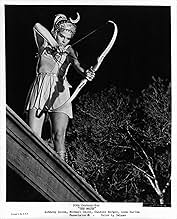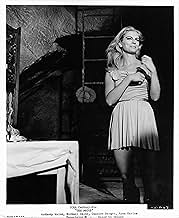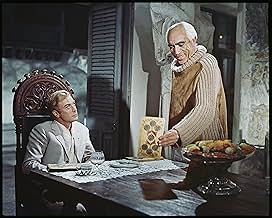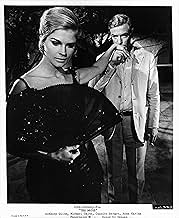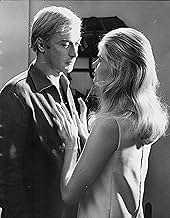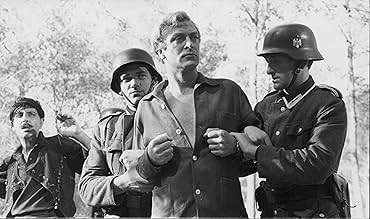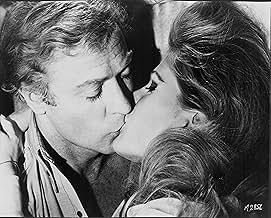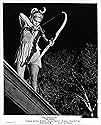A teacher on a Greek island becomes involved in bizarre mind games with the island's magus (magician) and a beautiful young woman.A teacher on a Greek island becomes involved in bizarre mind games with the island's magus (magician) and a beautiful young woman.A teacher on a Greek island becomes involved in bizarre mind games with the island's magus (magician) and a beautiful young woman.
- Nominated for 1 BAFTA Award
- 1 nomination total
Danièle Noël
- Soula
- (as Danielle Noel)
Andreas Malandrinos
- Goatherd
- (as Andreas Melandrinos)
Featured reviews
I've read the Fowles novels-- including the original and the "new, improved" versions of The Magus (BTW the "new, improved" version was a bad move John, you should have left the damn book alone with its ambiguities intact), so it ain't like I are illiterate or somethin'...
Seems to me a lot of people expect a movie to be a book, and it doesn't happen. If you have a deep connection with the print, you have to be able to temporarily wipe the preconceptions from your brain and deal with it as a distinct presentation of material, or you're not going to like it.
I'm pretty sure this is what happened amongst the literati who were expecting to see the book version of The Magus on screen. So they did a snobbish hatchet job via criticism.
IMHO, this is one of Anthony Quinn's best screen appearances. I can't think of anyone else who could have filled the role as well. Green's direction keeps the film moving right along. The location settings are wonderful. Got no problems with the script. Michael Caine plays a terrific self-serving exploiter of women and relationships-- but in fairness Anne is a gutless wimp asking to be exploited-- incapable of making her own decisions (at least as rendered in the film). Candice Bergen does a very credible job in the schizo role of Lily.
This movie deserves restoration into its original aspect ratio and re-releasing on DVD. And maybe, like Eliot said in the bit from Little Gidding used in the flick, you might arrive where you started and know the place for the first time.
Seems to me a lot of people expect a movie to be a book, and it doesn't happen. If you have a deep connection with the print, you have to be able to temporarily wipe the preconceptions from your brain and deal with it as a distinct presentation of material, or you're not going to like it.
I'm pretty sure this is what happened amongst the literati who were expecting to see the book version of The Magus on screen. So they did a snobbish hatchet job via criticism.
IMHO, this is one of Anthony Quinn's best screen appearances. I can't think of anyone else who could have filled the role as well. Green's direction keeps the film moving right along. The location settings are wonderful. Got no problems with the script. Michael Caine plays a terrific self-serving exploiter of women and relationships-- but in fairness Anne is a gutless wimp asking to be exploited-- incapable of making her own decisions (at least as rendered in the film). Candice Bergen does a very credible job in the schizo role of Lily.
This movie deserves restoration into its original aspect ratio and re-releasing on DVD. And maybe, like Eliot said in the bit from Little Gidding used in the flick, you might arrive where you started and know the place for the first time.
I saw The Magus in 1968 in Tokyo, Japan where I was stationed in the Air Force. I was with four other airmen who were bored looking for something to do in one of the world's largest cities.
One of the guys in our group had apparently read the book and suggested we go see it. "It will be a wild ride!", he said. By the time we walked out of the cinema we were,
1. In love with Candice Bergen.
2. Totally confused what point the movie was trying to convey.
The guy who had read the book? "I, uh, didn't really understand the book either. I was kinda hoping the movie would clear up my confusion."
It failed.
One of the guys in our group had apparently read the book and suggested we go see it. "It will be a wild ride!", he said. By the time we walked out of the cinema we were,
1. In love with Candice Bergen.
2. Totally confused what point the movie was trying to convey.
The guy who had read the book? "I, uh, didn't really understand the book either. I was kinda hoping the movie would clear up my confusion."
It failed.
Fowles' first novel became the darling of the emerging counterculture of the 60s. It fit a handy niche of layered narratives, connected in ways that emulated the emergence of "secret" cosmologies. By itself, it created a little stir because of the way it was folded by a certain kabbalistic technique while including reference to that technique.
The history of this makes it essential viewing. Its Fowles' first novel, partially autobiographical, taking over a decade to write. Its grand, risky, sloppy. It is perfect in its way, being as confusing in how it is written as the narrator within is. Its a happy accident that its deficiencies increase the effect.
The screenplay is quite a bit more incompetent and at the same time leaving out most of the ambiguities in the story. So the film is a disaster. Fowles would later straighten up the narrative in the novel and issue what in the film world would be a "director's cut" which tries to keep the ambiguities in the story but reduce them in the narration. Its far less effective than the original.
So why should you see this? Because it is a historical document that changed things significantly. Its based on two sources: one was a then little-known set of Kabbalistic lessons on Tarot ambiguities. The other is a piece of literary theory from the thirties: "Seven Types of Ambiguity." (Don't search it out: it is far less interesting than the title implies.)
Fowles simply conflated his own life (and remorse over handling a romance) into these two notions, deliberately trying to capture the seven types which incidentally inform my study of narrative folding.
In September of 1966 while in Spain for the filming of "How I Won the War," John Lennon, who hardly read anything, read this (twice, once heavily rugged) and it changed his life, the direction of The Beatles and hence enfranchised a new form of narrative. (He called and later visited Fowles while this script was in development. There is no artifact of that in the script.)
Its not Joyce, but it is the child of what he envisioned, dumbed down, but still raising the bar for narrative structure and affecting I assert nearly everything.
Ted's Evaluation -- 3 of 3: Worth watching.
The history of this makes it essential viewing. Its Fowles' first novel, partially autobiographical, taking over a decade to write. Its grand, risky, sloppy. It is perfect in its way, being as confusing in how it is written as the narrator within is. Its a happy accident that its deficiencies increase the effect.
The screenplay is quite a bit more incompetent and at the same time leaving out most of the ambiguities in the story. So the film is a disaster. Fowles would later straighten up the narrative in the novel and issue what in the film world would be a "director's cut" which tries to keep the ambiguities in the story but reduce them in the narration. Its far less effective than the original.
So why should you see this? Because it is a historical document that changed things significantly. Its based on two sources: one was a then little-known set of Kabbalistic lessons on Tarot ambiguities. The other is a piece of literary theory from the thirties: "Seven Types of Ambiguity." (Don't search it out: it is far less interesting than the title implies.)
Fowles simply conflated his own life (and remorse over handling a romance) into these two notions, deliberately trying to capture the seven types which incidentally inform my study of narrative folding.
In September of 1966 while in Spain for the filming of "How I Won the War," John Lennon, who hardly read anything, read this (twice, once heavily rugged) and it changed his life, the direction of The Beatles and hence enfranchised a new form of narrative. (He called and later visited Fowles while this script was in development. There is no artifact of that in the script.)
Its not Joyce, but it is the child of what he envisioned, dumbed down, but still raising the bar for narrative structure and affecting I assert nearly everything.
Ted's Evaluation -- 3 of 3: Worth watching.
I loved the gorgeous Greek scenery but the story, which is not something you can follow anyway, was even harder to follow in the movie. I cannot imagine how anyone watching the movie can get any kind of grip on it if they have not read the book, and then, like me, they would probably wonder why Australian Allison turned into French Anne, and many other seemingly pointless changes in the story. The mysteries in the book seemed to be chopped up or left out in the movie. I saw it when it first came out and had the same problems with it then, since I had read the book several times. I recently watched it with my granddaughter (very intelligent at 20 and usually into movies I like) who was mostly amazed at how young Michael Caine and Candace Bergen were in it, but otherwise could not imagine why one would watch it except for the scenery.
This movie received a critical mauling. Even the celebrities hated it, one of them (possibly Woody Allen) saying that if he had to live his life again he would do everything the same except he wouldn't go to see The Magus! However, I don't think it is that bad. It certainly isn't particularly good, but it carries a certain fascination in the way that it unpeels a multi-layered plot in a gleefully playful way. The main shortcoming is that some plot points are dealt with unclearly, making it a bit tricky to figure out exactly what is going on. The ending in particular seems to be a bit confusing. However, on the plus side, there are some powerful visuals. There are also strong leading performances from Michael Caine and Anthony Quinn, as well as a memorable turn from Anna Karina as one of Caine's ex-lovers. Candice Bergen gives a terrible performance, but perhaps the character she is given to work with was unplayable anyway. Don't listen to the critics. See this one for yourself and judge it on your own terms.
Did you know
- TriviaSir Michael Caine lists this, along with The Swarm (1978) and Ashanti (1979), as one of the worst movies he ever made. This is mainly down to the fact that no one, least of all the audience, knew what it was about.
- GoofsIn the rented room where the English professor will live while continuing the teaching work of his predecessor in the so-called Greek island, there is a rather conspicuous historical XIX century Spanish painting by José Casado del Alisal which represents the first defeat of Napoleon's armies in Spain, in the city of Bailén, where Marechal Philippe Antoine Dupont de l'Estang surrendered to inexperienced Spanish General Castaños on 19 July 1808. Not quite a Hellenic topic, really.
- Quotes
Maurice Conchis: All men feel the need to risk death at least once in their life. War is a very unscientific answer to that need.
- ConnectionsFeatured in Denúncia Vazia (1979)
- How long is The Magus?Powered by Alexa
Details
- Runtime
- 1h 57m(117 min)
- Color
- Aspect ratio
- 2.35 : 1
Contribute to this page
Suggest an edit or add missing content

